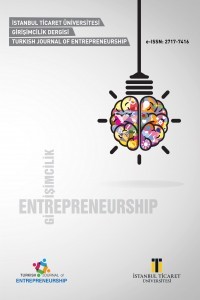AKADEMİK DÜNYA VE GİRİŞİMCİLER ARASINDA BİLGİ ALIŞVERİŞİNİN ÖNEMİ: MOBİL BANKACILIK VE E-PARA
IMPORTANCE OF KNOWLEDGE EXCHANGE BETWEEN ACADEMIA AND ENTREPRENEURS: MOBILE BANKING AND E-MONEY
Knowledge exchange, innovation, legal academia, mobile banking emoney,
___
- Angelovska-Wilson A. and Feltault J., (2007) ‘M-payments: The next frontier – current developments and challenges in international implementation of mypayments’, Journal of International Business Law Review, 22 (11), 575.
- Allen F. and Herring R., Banking Regulation versus Securities Market Regulation, Wharton School, University of Philadelphia, July 11, 2001, https://pdfs.semanticscholar.org/c1c3/806317d5d7f378b43b9306ff3b0a63 00984d.pdf
- Arvey R., “Why Face-to-Face Business Meetings Matter”, A White Paper - Business School, National University of Singapore, available at: http://www.colestraining.com/wp-content/uploads/2009/10/Meetings-WhyFace-to-Face-Business-Meetings-Matter-a-white-paper-by-Dr-Richard-Arvey1.pdf.
- BBC News – Technology, ‘Mobile firms bleed billions to fraud and bill errors’, 29 March 2012, www.bbc.co.uk/news/technlogy-17551858.
- Bills S., (2007) ‘Visa in Contactless Pacts with 2 Phone Providers, American Banker, 29 March.
- Bradford, J., ‘Knowledge Networks for Innovation: from Theory into Practice, the case for SMEs’, http://www.jbsh.co.uk/wp-content/uploads/2012/02/b19.pdf.
- BUDDE, 2016 (a), http://www.budde.com.au/Research/Egypt-Mobile-MarketOverview-Statistics-and-Forecasts.html#sthash.DWWmhxhH.dpuf.
- BUDDE, 2016 (b), http://www.budde.com.au/Research/Jordan-TelecomsMobile-Broadband-and-Forecasts.html#sthash.2buLTfRC.dpuf
- Crawford B., (1992) ‘Is Electronic Money Really Money?’ 12 Buffalo Law Review, 399.
- Curtis D. M., (2008) ‘Why law student need to know the business of being a lawyer’, Albany Law Review, 71, 201.
- Donovan, C. (2007) ‘The qualitative future of research evaluation’, Science and Public Policy, 34 (8): 585–97.
- Etzkowitz H. and Leydedorff L., (2000) ‘The dynamics of innovation: From National System and Mode to a Triple Helix of University-Industry-Government Relations’, Research Policy, 29 (2), 109-123.
- Harbottle and Lewis, ‘Can there be a better future for e-money in the EU?’, EFinance & Payment Law and Policy, (2010) Vol. 4, Issue 2; http://www.cecileparkmedia.com/payments-and-fintechlawyer/article_template.asp?from=efplp&ID=1223&Search=Yes&txtsearch=%20 google%20checkout.
- International Telecommunication Union (ITU), The World in 2011 – Facts and Figures, www.itu.int/ITU-D/ict/facts/2011/material/ICTFactsFigures2011.pdf.
- Lord Chancellor's Advisory Committee on Legal Education and Conduct, First Report on Legal Education and Training (London: ACLEC, 1996).
- Mobile Payment Forum, www.mobilepaymentforum.org/pdfs_MPF_Security_Best_Practices.pdf.
- MobiThinking, Global Mobile Statistics 2011: November 2011, http://mobileithinking.com/mobile-marketing-tools/latest-mobile-stats.
- Model Law on International Credit Transfers, 1994, www.uncitral.org/pdf/english/texts/payments/transfers/ml-creittrans.pdf
- Orange, In Africa, Orange Money is making life easier, 04 May 2014, http://www.orange.com/en/Footer/Thematic-features/2015/SFM/In-AfricaOrange-Money-is-making-your-life-easier.
- Phipps, D. and Shapson, S. (2009) ‘Knowledge mobilisation builds local research collaborations for social innovation’, Evidence & Policy, 5 (3): 211–27.
- Phipps D. and Morton, (2013) ‘Qualities of Knowledge Brokers: Reflections form Practice’, Evidence & Policy, 9 (2): 255-65.
- Porteous D., The Enabling Environment for Mobile banking in Africa, Department for International Development, (2006), p. 28, http://siteresources.worldbank.org/INTTOPCONF3/Resources/Final_Report _ENABLING_ENVIRONMENT_FOR_CELL_PHONE_BANKING_IN_AFRICA_P 1.doc.
- Pusey, I., ‘The role of the regulator in combating financial crimes – a Caribbean perspective’, (2007) Journal of Financial Crime, Vol. 14, No. 3.
- Roberts G., ‘Fraudsters, phishers, hackers and scammers: who pays the price?’ (2009) Banking Law, 3(1), 9-11.
- Robertson D. H., Money, (Chicago: University of Chicago Press, 1962) at 2-3.
- Saad M. and Zawdie G., (2011) ‘Introduction to special issue: The emerging role of universities in socio-economic development through knowledge networking’ Science Schwab K., The Global Competitiveness Report 2013-14, World Economic Forum, p. 537, http://www3.weforum.org/docs/WEF_GlobalCompetitivenessReport_2013- 14.pdf.
- Schlierf K. and Meyer M., (2013) ‘Situating knowledge intermediation: Insights from science shops and knowledge brokers’, Science and Public Policy, 40, 430-441.
- Sir Witty A., ‘Encouraging a British Invention Revolution: Sir Andrew Witty’s Review of Universities and Growth, October 2013, p. 36, https://www.gov.uk/government/uploads/system/uploads/attachment_data/fil e/249720/bis-13-1241-encouraging-a-british-invention-revolution-andrew-wittyreview-R1.pdf. Universities
- UK, http://globalhighered.files.wordpress.com/2009/11/economicimpact4full.pdf. Universities UK, http://www.universitiesuk.ac.uk/policy-andanalysis/reports/Documents/2014/the-economic-impact-of-heis-in-england.pdf. Research Excellence Framework, http://www.ref.ac.uk.
- Stetler, C. et al., (2011) ‘A guide for applying a revised version of the PARIHS framework for implementation’, Implementation Science, 6: 99, www.implementationscience.com/content/6/1/99.
- Strauss, S.G., & McGrath, J. E. (1994). Does the medium matter? The interaction of task type and technology on group performance and member reactions. Journal of Applied Psychology, 79, 87-97
- Strauss, S., (1996) ‘Getting a clue: The effects of communication media and information distribution on participation and performance in computer- mediated and face-to-face groups’ Small Group Research, 27, 115-142.
- Symantec’s advice: Symantec Enterprise Security, Wireless LAN Security – Enabling and Protecting Enterprise (White Paper, 2011), http://eval.symantec.com/mktginfo/downloads/EnterpriseSecurityFramew ork.pdf.
- The Economist, ‘Cash Call’, 15 February 2007.
- The Statistics Portal, https://www.statista.com/statistics/268636/telecommunications-servicesrevenue-since-2005-by-region/.
- The World Bank, 2002, Constructing Knowledge Societies: New Challenges for Tertiary Education, http://siteresources.worldbank.org/INTAFRREGTOPTEIA/Resources /Constructing_Knowledge_Societies.pdf
- United Nations Commission on International Trade Law (UNCITRAL) – UNCITRAL, Model Law on Electronic Commerce, 1996, www.uncitral.org/uncitral_texts/electronic_commerce/1996Model.html. Winn J. K., ‘Clash of the Titans: Regulating the Competition Between Established and Emerging Electronic Payment Systems’, 14 Berkeley Tech. L. J. [1999] 675-709.
- World Economic Forum, 2010, http://www3.weforum.org/docs/WEF_GlobalCompetitivenessReport_2010 -11.pdf.
- ISSN: 2536-4456
- Yayın Aralığı: Yılda 2 Sayı
- Başlangıç: 2017
- Yayıncı: İstanbul Ticaret Üniversitesi
REKABET AVANTAJI YARATMADA ARAÇ OLARAK SOSYAL GİRİŞİMCİLİK: TEORİK BİR YAKLAŞIM
N Öykü İYİGÜN, Murat YALÇINTAŞ
TÜRKİYE’DE KADINLARI GİRİŞİMCİLİĞE YÖNELTEN FAKTÖRLER KARŞILAŞTIKLARI SORUNLAR VE ÇÖZÜM ÖNERİLERİ
İ Kahraman ARSLAN, M Demet TOKSOY
TÜRKİYE’DEKİ AKREDİTE MELEK YATIRIMCI AĞLARININ GELİŞİMİNİN VE KARAKTERİSTİK ÖZELLİKLERİNİN ANALİZİ
TİCARİ BİR KAVRAM OLARAK MİSAFİRPERVERLİK: GİRİŞİMCİLİK EKSENİNDE YENİDEN YAPILANMA
Uğur Yasin ASAL, Uğur Yasin ASAL
Beliz ÜLGEN, Ebru AKTAŞ, Elif Hayrullah ASLAN
AKADEMİK DÜNYA VE GİRİŞİMCİLER ARASINDA BİLGİ ALIŞVERİŞİNİN ÖNEMİ: MOBİL BANKACILIK VE E-PARA
